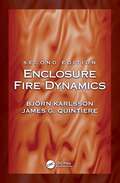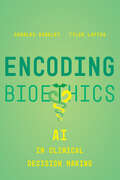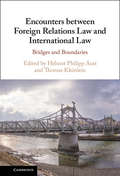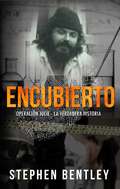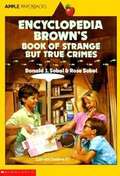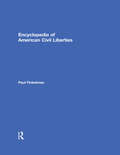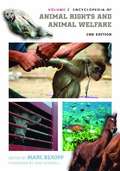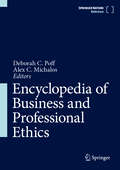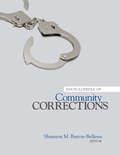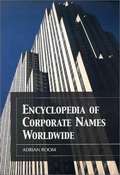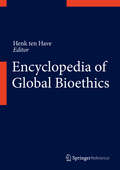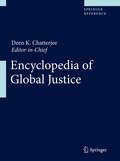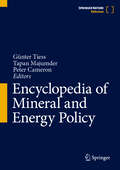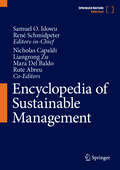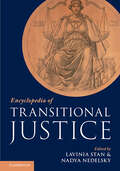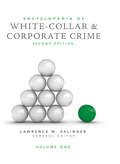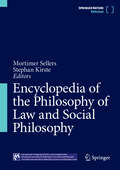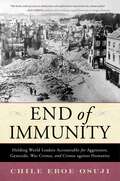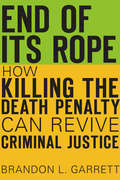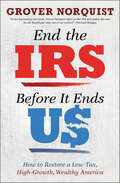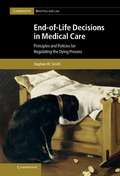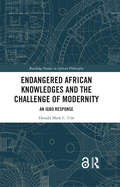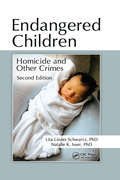- Table View
- List View
Enclosure Fire Dynamics, Second Edition
by James G. Quintiere Björn KarlssonEnclosure Fire Dynamics, Second Edition explores the science of enclosure fires and how they cause changes in the environment of a building on fire. The authors discuss mechanisms controlling enclosure fires and how to develop analytical relationships useful in designing buildings for fire safety. Derivation of equations from first principles is shown, stating assumptions and showing comparisons to experimental data, giving calculated examples for clarity. The text provides readers with the skills needed to solve a range of engineering equations and problems. Features include: Describes the outbreak of compartment fires and the mechanisms controlling them Derives simple analytical relationships from first principles and shows how to compare the derived equations with experimental data, giving calculated examples for clarity. Provides the calculational procedures and describes computer models needed to design a building for safety Cites the most up-to-date standards and references throughout Includes numerous chapter problems to test student readers’ understanding of fire behavior Enclosure Fire Dynamics, Second Edition will enhance the knowledge of fire protection engineers, researchers, and investigators and help build a strong foundation for engineering students.
Encoding Bioethics: AI in Clinical Decision-Making
by Charles Binkley Tyler LoftusEncoding Bioethics addresses important ethical concerns from the perspective of each of the stakeholders who will develop, deploy, and use artificial intelligence systems to support clinical decisions. Utilizing an applied ethical model of patient-centered care, this book considers the viewpoints of programmers, health system and health insurance leaders, clinicians, and patients when AI is used in clinical decision-making. The authors build on their respective experiences as a surgeon-bioethicist and a surgeon–AI developer to give the reader an accessible account of the relevant ethical considerations raised when AI systems are introduced into the physician-patient relationship.
Encounters between Foreign Relations Law and International Law: Bridges and Boundaries
by Helmut Philipp Aust Thomas KleinleinForeign relations law and public international law are two closely related academic fields that tend to speak past each other. As this innovative volume shows, the two are closely interrelated and depend on each other for their mutual construction and identity. A better understanding of this relationship is of vital importance for upholding important constitutional values like democracy, the rule of law and the protection of human rights, while enabling states to engage in meaningful forms of international cooperation. The book takes a close look at the encounters between the two fields and offers perspectives for a constructive engagement between the two. Collectively, the contributions argue that the delimitation between the two fields occurs in a hybrid zone of interaction which requires both bridges and boundaries: bridges for the construction of the relationship between the two fields, and boundaries for preserving key normative expectations of both domestic and international law. This title is also available as Open Access on Cambridge Core.
Encubierto; Operación Julie - La Verdadera Historia
by Stephen BentleyEn marzo de 1978, en la culminación de Operación Julie quince acusados, incluyendo doctores, químicos investigadores, un escritor y vendedores de drogas “profesionales” fueron sentenciados a un total combinado de ciento veinticuatro años de prisión. La Operación Julie es, hasta el momento, el punto de referencia para todas las operaciones encubiertas y entrenamiento británico. En 2011, la BBC dijo que esta operación policíaca única y masiva fue el comienzo de la guerra a las drogas. Stephen Bentley fue uno de cuatro detectives encubiertos que trabajó en la Operación Julie, una de las redadas contra las drogas más grandes en el mundo. Junto con su compañero encubierto, infiltró a la banda que producía alrededor del 90 por ciento del LSD en el mundo y descubrió un complot para importar grandes cantidades de cocaína boliviana al Reino Unido. El bajo mundo conocía al autor como Steve Jackson. ¿Cómo logró infiltrar las dos pandillas con éxito? ¿Tuvo que tomar drogas, y de qué manera “vivir una mentira” lo afectó? Descubra las respuestas y penetre en la mente de Steve Jackson, detective encubierto. “Una perspectiva desde adentro sobre el tráfico de drogas, escrito con encanto, inteligencia y a veces humor, por un hombre talentoso, calificado de manera única para contar la historia.” –Extracto de una Revisión. “No hay drama televisivo en donde los buenos tipos y los malos tipos se pueden identificar fácilmente y donde el crimen se resuelve en una hora de tiempo al aire. En la historia de la vida real de Operación Julie, las líneas que la definen no son tan claras y me encontré intriguido por la amistad que se desarrolló entre el Sr. Bentley y uno de los hombres que estaba investigando, preguntándome cómo resolvería esta difícil situación cuando el desenlace final llegara.” -- Extracto de una Revisión. “Visión fascinante al turbio mundo del trabajo policial encubie
Encyclopedia Brown's Book of Strange but True Crimes
by Donald J. Sobol Rose SobolEncyclopedia Brown's scrapbook with over 200 unbelievable but true stories.
Encyclopedia of American Civil Liberties: Volumes A-z
by Paul FinkelmanThis Encyclopedia on American history and law is the first devoted to examining the issues of civil liberties and their relevance to major current events while providing a historical context and a philosophical discussion of the evolution of civil liberties. Coverage includes the traditional civil liberties: freedom of speech, press, religion, assembly, and petition. In addition, it also covers concerns such as privacy, the rights of the accused, and national security. Alphabetically organized for ease of access, the articles range in length from 250 words for a brief biography to 5,000 words for in-depth analyses. Entries are organized around the following themes: organizations and government bodies legislation and legislative action, statutes, and acts historical overviews biographies cases themes, issues, concepts, and events. The Encyclopedia of American Civil Liberties is an essential reference for students and researchers as well as for the general reader to help better understand the world we live in today.
Encyclopedia of Animal Rights and Animal Welfare
by Marc BekoffBekoff (U. of Colorado, Boulder) presents an updated reference for students, researchers, and general readers covering the full scope of animal rights and animal welfare from a global, interdisciplinary perspective. Thoroughly revised to reflect developments since publication of the first edition 11 years ago, the text has been expanded from a one- to two-volume publication. It contains 207 entries, by 150 international experts, covering an array of topics, from dog fighting to endangered species in zoos, animals as disease carriers, conservation ethics, and veganism. The second edition features a number of entries on various cultural and religious views of animals, and the latest research on animal cognition and sentience. Each entry offers a brief summarization of the issue and includes a list of publications for further reading. The text also includes a new foreword by Jane Goodall, a chronology of historical events, and a list of print and online resources. Annotation c2010 Book News, Inc., Portland, OR (booknews.com)
Encyclopedia of Business and Professional Ethics
by Alex C. Michalos Deborah C. PoffThis encyclopedia, edited by the past editors and founder of the Journal of Business Ethics, is the only reference work dedicated entirely to business and professional ethics. Containing over 2000 entries, this multi-volume, major research reference work provides a broad-based disciplinary and interdisciplinary approach to all of the key topics in the field. The encyclopedia draws on three interdisciplinary and over-lapping fields: business ethics, professional ethics and applied ethics although the main focus is on business ethics. The breadth of scope of this work draws upon the expertise of human and social scientists, as well as that of professionals and scientists in varying fields. This work has come to fruition by making use of the expert academic input from the extraordinarily rich population of current and past editorial board members and section editors of and contributors to the Journal of Business Ethics.
Encyclopedia of Community Corrections
by Shannon M. Barton-BellessaIn response to recognition in the late 1960s and early 1970s that traditional incarceration was not working, alternatives to standard prison settings were sought and developed. One of those alternatives—community-based corrections—had been conceived in the 1950s as a system that might prove more progressive, humane, and effective, particularly with people who had committed less serious criminal offenses and for whom incarceration, with constant exposure to serious offenders and career criminals, might prove more damaging than rehabilitative. The alternative of community corrections has evolved to become a substantial part of the criminal justice and correctional system, spurred in recent years not so much by a progressive, humane philosophy as by dramatically increasing prison populations, court orders to "fix" overextended prison settings, and an economic search for cost savings. Although community correction programs have been in place for some 40 years now, to date no comprehensive reference resource has tackled this topic. Accessible and jargon-free and available in both print and electronic formats, the one-volume Encyclopedia of Community Corrections will explore all aspects of community corrections, from its philosophical foundation to its current inception.Features & Benefits:150 signed entries (each with Cross References and Further Readings) are organized in A-to-Z fashion to give students easy access to the full range of topics in community corrections.A thematic Reader's Guide in the front matter groups entries by broad topical or thematic areas to make it easy for users to find related entries at a glance.In the electronic version, the Reader's Guide combines with a detailed Index and the Cross References to provide users with convenient search-and-browse capacities.A Chronology in the back matter helps students put individual events into broader historical context.A Glossary provides students with concise definitions to key terms in the field.A Resource Guide to classic books, journals, and web sites (along with the Further Readings accompanying each entry) guides students to further resources in their research journeys.An Appendix offers statistics from the Bureau of Justice.
Encyclopedia of Corporate Names Worldwide
by Adrian RoomEntries in this encyclopedia give the stories behind some 3,500 commercial names, mainly from America and Britain but including some from European countries.
Encyclopedia of Global Bioethics
by Henk HaveThis work presents the first comprehensive and systematic treatment of all relevant issues and topics in contemporary global bioethics. Now that bioethics has entered into a novel global phase, a wider set of issues, problems and principles is emerging against the backdrop of globalization and in the context of global relations. This new stage in bioethics is furthermore promoted through the ethical framework presented in the UNESCO Universal Declaration on Bioethics and Human Rights adopted in 2005. This Declaration is the first political statement in the field of bioethics that has been adopted unanimously by all Member States of UNESCO. In contrast to other international documents, it formulates a commitment of governments and is part of international law (though not binding as a Convention). It presents a universal framework of ethical principles for the further development of bioethics at a global level. The Encyclopedia of Global Bioethics caters to the need for a comprehensive overview and systematic treatment of all pertinent new topics and issues in the emerging global bioethics debate. It provides descriptions and analysis of a vast range of important new issues from a truly global perspective and with a cross-cultural approach. New issues covered by the Encyclopedia and neglected in more traditional works on bioethics include, but are not limited to, sponsorship of research and education, scientific misconduct and research integrity, exploitation of research participants in resource-poor settings, brain drain and migration of healthcare workers, organ trafficking and transplant tourism, indigenous medicine, biodiversity, commodification of human tissue, benefit sharing, bio industry and food, malnutrition and hunger, human rights and climate change.
Encyclopedia of Global Bioethics
by Henk Ten HaveThis work presents the first comprehensive and systematic treatment of all relevant issues and topics in contemporary global bioethics. Now that bioethics has entered into a novel global phase, a wider set of issues, problems and principles is emerging against the backdrop of globalization and in the context of global relations. This new stage in bioethics is furthermore promoted through the ethical framework presented in the UNESCO Universal Declaration on Bioethics and Human Rights adopted in 2005. This Declaration is the first political statement in the field of bioethics that has been adopted unanimously by all Member States of UNESCO. In contrast to other international documents, it formulates a commitment of governments and is part of international law (though not binding as a Convention). It presents a universal framework of ethical principles for the further development of bioethics at a global level. The Encyclopedia of Global Bioethics caters to the need for a comprehensive overview and systematic treatment of all pertinent new topics and issues in the emerging global bioethics debate. It provides descriptions and analysis of a vast range of important new issues from a truly global perspective and with a cross-cultural approach. New issues covered by the Encyclopedia and neglected in more traditional works on bioethics include, but are not limited to, sponsorship of research and education, scientific misconduct and research integrity, exploitation of research participants in resource-poor settings, brain drain and migration of healthcare workers, organ trafficking and transplant tourism, indigenous medicine, biodiversity, commodification of human tissue, benefit sharing, bio industry and food, malnutrition and hunger, human rights and climate change.
Encyclopedia of Global Justice
by Deen K. ChatterjeeThis two-volume Encyclopedia of Global Justice, published by Springer, along with Springer's book series, Studies in Global Justice, is a major publication venture toward a comprehensive coverage of this timely topic. The Encyclopedia is an international, interdisciplinary, and collaborative project, spanning all the relevant areas of scholarship related to issues of global justice, and edited and advised by leading scholars from around the world. The wide-ranging entries present the latest ideas on this complex subject by authors who are at the cutting edge of inquiry. The Encyclopedia sets the tone and direction of this increasingly important area of scholarship for years to come. The entries number around 500 and consist of essays of 300 to 5000 words. The inclusion and length of entries are based on their significance to the topic of global justice, regardless of their importance in other areas.
Encyclopedia of Mineral and Energy Policy
by Peter Cameron Günter Tiess Tapan MajumderThis Encyclopedia provides a cutting-edge, up-to-date reference source on mineral and energy policies around the world. It offers information on GDP, population, investment scenarios and current environmental regulations in over one hundred thirty countries from 13 geographic regions around the world. It covers topics such as geo-conservation, deep mining technology as well as rare earth, green technology and international organizations that are actively involved in minerals and energy through exploration, arbitration, marketing and investment. Topical entries are presented alphabetically with extensive cross-referencing to ensure user-friendly reading. This Encyclopedia presents the work of more than 20 section editors and more than 100 international experts in the fields of mineral and energy policies. It is designed as a essential resource for researchers, students, libraries, industry, governments, and international organizations and presents a wealth of insights and guidance for corporate planning regarding exploration and financial investments, as well as for venture capitalist and international funding bodies. As such, it provides an indispensable point of reference for future research on mineral and energy policy.
Encyclopedia of Sustainable Management
by Nicholas Capaldi Samuel O. Idowu René Schmidpeter Liangrong Zu Mara Del Baldo Rute AbreuThis encyclopedia is the most comprehensive and up-to-date source of reference for sustainability in business and management. It covers both traditional and emerging concepts and terms and is fully international in its scope. More than 700 contributions of internationally renowned experts provide a definitive access to the knowledge in the area of sustainable and responsible management. All actors in the field will find reliable and up to date definitions and explanations of the key terms and concepts of management in this reference work. The Encyclopedia of Sustainable Management represents all aspects of management and business conduct. It takes sustainability as a management concept that gives due credit to the complexity and diverging constraints in which businesses and corporations act today, and it emphasizes and focuses approaches that help ensure that today's management decisions and actions will be the basis for tomorrow's prosperity.
Encyclopedia of Transitional Justice
by Lavinia Stan Nadya NedelskyThe Encyclopedia of Transitional Justice remains the premier reference tool that presents the state of the art in the field of reckoning with the legacy of past gross human rights abuses. Almost 200 scholars and practitioners from all continents summarize country efforts to address and redress the recent past, and present key transitional justice methods, debates, institutions and concepts. Both state and non-state initiatives are concisely overviewed. Written in an accessible style but with an eye to detail and accuracy, the entries include the latest research in the field and provide suggestions for further readings. Widely consulted by academics, practitioners, government officials and civil society representatives, the Encyclopedia is unmatched in the number of countries, institutions, debates, as well as methods, programs and practices it covers.
Encyclopedia of White-Collar and Corporate Crime
by Lawrence M. SalingerSince the first edition of the Encyclopedia of White Collar and Corporate Crime was produced in 2004, the number and severity of these crimes have risen to the level of calamity, so much so that many experts attribute the near-Depression of 2008 to white-collar malfeasance, namely crimes of greed and excess by bankers and financial institutions. Whether the perpetrators were prosecuted or not, white-collar and corporate crime came near to collapsing the U.S. economy. In the 7 years since the first edition was produced we have also seen the largest Ponzi scheme in history (Maddoff), an ecological disaster caused by British Petroleum and its subcontractors (Gulf Oil Spill), and U.S. Defense Department contractors operating like vigilantes in Iraq (Blackwater). White-collar criminals have been busy, and the Second Edition of this encyclopedia captures what has been going on in the news and behind the scenes with new articles and updates to past articles.
Encyclopedia of the Philosophy of Law and Social Philosophy: Volume 3: From Ross To Dworkin And Beyond (Studies In The History Of Law And Justice Ser. #24)
by Mortimer Sellers Stephan KirsteThis encyclopedia covers all topics in the philosophy of law and social philosophy, including the history, theory, and leading theorists in both fields. Featuring specially commissioned entries by an international team of the world's most respected scholars, including more than 700 entries ensuring its place as the definitive reference work on the Philosophy of Law and Social Philosophy.The encyclopedia provides: 1) a clear concise expert definition and explanation of the key concepts in the field, written by leading scholars; 2) an essential reference for experts and newcomers alike, with entries ranging from short definitions of key terms to extended explorations of major topics; 3) an investigation of questions that have traditionally defined the field, but also more recent developments, significantly updating the fields of the philosophy of law and social philosophy; 4) introductions to theories and research developed in all the world's languages and legal traditions.
End Game: Dirty Money 4 (Dirty Money)
by Lisa Renee JonesWall Street meets Sons of Anarchy in End Game, the smouldering, scorching fourth novel in the explosively sexy Dirty Money series from New York Times bestseller Lisa Renee Jones, author of the Inside Out series.How deep can you love?After tragedy strikes, Shane Brandon hovers on the edge of being consumed by darkness. He will fight for Emily Stevens, the woman he loves. He will destroy his enemy. He will not back down. And as shocking twists, dark secrets, and explosive betrayals within the Brandon family come to the light, Shane must fight harder than ever before.Every thread weaves a dangerous web. Emily and Derek. Brandon Senior. Maggie and her affair. The leader of the dangerous cartel that's wedged itself inside the Brandon Empire. It all comes to a head when passion and danger collide in the explosive conclusion to the Dirty Money series.Are you ready to play by the hard rules of the Brandon family empire? Check out the other compelling novels in the Dirty Money series: Hard Rules, Damage Control and Bad Deeds.
End of Immunity: Holding World Leaders Accountable for Aggression, Genocide, War Crimes, and Crimes against Humanity
by Chile Eboe-OsujiRussia&’s invasion of Ukraine in 2022 has shown the world the critical importance of whether and how to punish heads of state, heads of government, and sundry strong men when accused of crimes of aggression, genocide, war crimes, and other crimes against humanity. In End of Immunity, former President of the International Criminal Court, Chile Eboe-Osuji, probes the history and theory of the concept of immunity for heads of state, underscoring tribunal achievements, pointing out gaps in the existing framework of accountability and the hypocrisies that produced them, and offering workable solutions to the loopholes that government leaders still use to escape consequences today.Eboe-Osuji traces the development of international law from the pre-World War I era that left wars of aggression as the prerogative of sovereigns able to wage them through the peacetime conferences of the Hague at the turn of the 20th century, the momentous Article 227 of the Versailles Peace Treaty of 1919, which communicated the resolve of the Allies and Associated Powers to prosecute German Emperor and King of Prussia Kaiser Wilhelm II before an international tribunal, how the legal norms applied in the post-WWII Nuremberg trial transformed the norms of modern international law, how 1990&’s Africa breathed new life into arguments against immunity for heads of state, and how modern-day Russia flouts those laws with Putin&’s war of aggression on Ukraine. Going as far back as the Middle Ages and the ancient doctrine of the divine right of kings, and concluding with a fresh new proposal for the ways in which international law can be shored up to prosecute those leaders who wage wars of aggression, Eboe-Osuji investigates the journey of international law&’s rejection of immunity for anyone – including heads of state in particular – when they are suspected or accused of atrocities that international law has proscribed as crimes. The result is the definitive account of a profoundly vital principle for international relations and global humanity.
End of Its Rope: How Killing the Death Penalty Can Revive Criminal Justice
by Brandon L. GarrettToday, death sentences in the U.S. are as rare as lightning strikes. Brandon Garrett shows us the reasons why, and explains what the failed death penalty experiment teaches about the effect of inept lawyering, overzealous prosecution, race discrimination, wrongful convictions, and excessive punishments throughout the criminal justice system.
End the IRS Before It Ends Us: How to Restore a Low Tax, High Growth, Wealthy America
by Grover NorquistAs the recent scandal shows, the IRS is big, bad, and out of control. Grover Norquist analyzes the problems within the agency and presents solutions to rein them in.The driving force behind the American Revolution was our forefathers' refusal to accept unfair taxation. Citizens rose up, won a war against impossible odds, and established the most unique government on the face of the earth, with taxes set at about 2 percent.How much has changed since 1776?The strength of Americans resolve is still unrivaled, and Grover Norquist, founder and president of Americans for Tax Reform, knows that once liberty-loving Americans learn the truth behind the oppressive and prosperity-stifling taxes we face today, they'll rise up again.Urging his fellow citizens to join him, Norquist tells a powerful and urgent story that will convince you we must act now to End This Before It Ends Us.
End-of-Life Decisions in Medical Care
by Stephen W. SmithThose involved in end-of-life decision making must take into account both legal and ethical issues. This book starts with a critical reflection of ethical principles including ideas such as moral status, the value of life, acts and omissions, harm, autonomy, dignity and paternalism. It then explores the practical difficulties of regulating end-of-life decisions, focusing on patients, healthcare professionals, the wider community and issues surrounding 'slippery slope' arguments. By evaluating the available empirical evidence, the author identifies preferred ways to regulate decisions and minimise abuses at the end of life, and outlines an ethical theory which can provide practical guidance for those engaged in end-of-life decisions.
Endangered African Knowledges and the Challenge of Modernity: An Igbo Response (Routledge Studies in African Philosophy)
by Donald Mark UdeThis book presents an innovative African philosophical response to coloniality and the attendant epistemicide of Africa’s knowledge systems, drawing on Igbo thinking.This book argues that theorizing modernity requires a critical conversation between African and Western scholarship, in order to unpack its links with coloniality and the subjugation of Africa’s indigenous knowledges. In setting out this discussion, the book also connects with Latin American scholarship, demonstrating how the modern world is structured to marginalize and destroy knowledges from across the Global South. This book draws on Igbo epistemic resources of solidarity thinking, positioned in contrast to capitalist knowledge-patterns, thereby providing an important Africa-driven response to modernity and coloniality. This book concludes by arguing that the Igbo sense of solidarity is useful and relevant to modern contexts and thus constitutes a vital resource for a less disruptive, more balanced, and more wholesome modernity.At a time of considerable global crises, this book makes an important contribution to philosophy both within Africa and beyond.
Endangered Children: Homicide and Other Crimes, Second Edition
by Lita Linzer Schwartz Natalie K. IsserFrom infancy onward, children are in danger from many sources, including parental and sibling abuse, drug abuse and mental illness in the home, parental neglect, and poverty. Removing an at-risk child from a troubled environment brings on a host of new concerns and is not always a panacea. Endangered Children: Homicide, and Other Crimes, Second Edi
